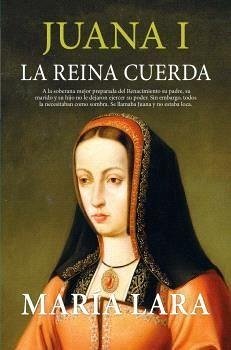
Juana I, La Reina Cuerda
Versandkostenfrei!
Versandfertig in über 4 Wochen
12,99 €
inkl. MwSt.

PAYBACK Punkte
6 °P sammeln!
Descrita en su juventud como ômuy cuerdaö, ¿por qué se torcieron las cosas en la existencia de Juana? ¿Fue tan ôhermosoö su marido? ¿Padecía Juana una enfermedad latente que se le aceleró con la distancia con Castilla? ¿Acentuaron los embarazos una dolencia silenciosa hasta entonces? ¿Constituyeron los celos la causa de su patología? ¿Por qué a Isabel la Católica a finales del Medievo se le permitió reinar y a su heredera no, en pleno Renacimiento, con el humanismo como doctrina? ¿Utilizó Juana la enajenación que le achacaban a modo de máscara neuronal? ¿A qué valores se...
Descrita en su juventud como ômuy cuerdaö, ¿por qué se torcieron las cosas en la existencia de Juana? ¿Fue tan ôhermosoö su marido? ¿Padecía Juana una enfermedad latente que se le aceleró con la distancia con Castilla? ¿Acentuaron los embarazos una dolencia silenciosa hasta entonces? ¿Constituyeron los celos la causa de su patología? ¿Por qué a Isabel la Católica a finales del Medievo se le permitió reinar y a su heredera no, en pleno Renacimiento, con el humanismo como doctrina? ¿Utilizó Juana la enajenación que le achacaban a modo de máscara neuronal? ¿A qué valores se aferraba para mantener la valentía frente a sus captores?Durante casi 50 años Juana, la reina más famosa de España y sin embargo con menos poder, estuvo confinada en el palacio de Tordesillas. Cuando llegó tenía 29 años y murió en aquella clausura a la edad de 75. A excepción de las risas infantiles, a lo largo de toda su vida fue tratada como una marioneta. Ella, que era la princesa más sabia de su tiempoàSin buscarlo, Juana fue en el tablero un peón movido a su antojo por su padre, Fernando, por su esposo, Felipe, y por su hijo, Carlos. Dicen que detrás de la historia del ajedrez, traído a la Península Ibérica por los musulmanes, se esconde enigmáticamente la figura de su madre, la Dama... Isabel designó a Juana como heredera en su testamento, aunque en la práctica se hizo caso omiso a su mandato.Con paciencia y rigor científico María Lara, doctora en Historia Moderna, reconstruye la vida cotidiana de Juana de Trastámara, desde la pesquisa sobre su lugar de nacimiento hasta su ocaso un Viernes Santo después de haber sido tildada de hereje. Investigando en los archivos, la escritora se adentra en el universo emocional de Juana, la emperatriz a la que nunca se le reconoció el título, la mística que convivió con el cadáver de Felipe como llave para su libertad. Esta es la historia de Juana, la reina cuerda.


